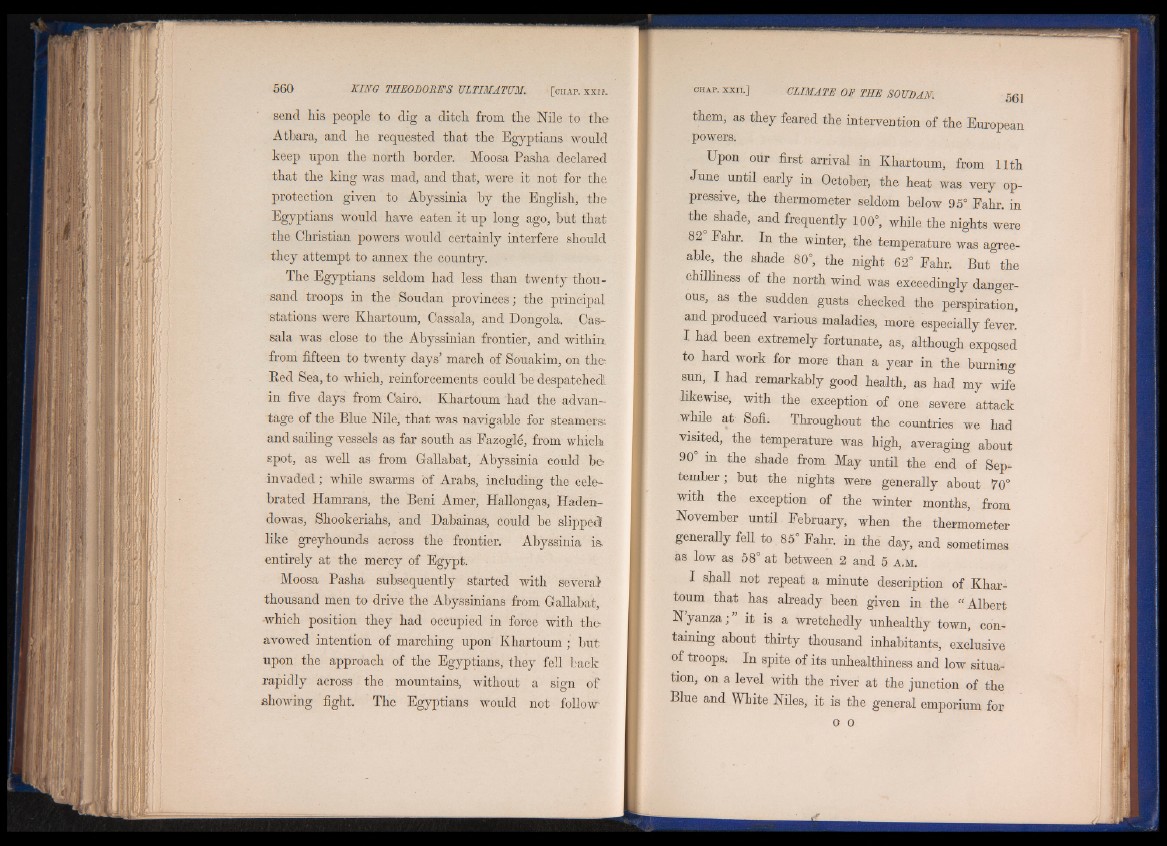
send his people to dig a ditch from the Nile to the
Atbara, and he requested that the Egyptians would
keep upon the north border. Moosa Pasha declared
that the king was mad, and that, were it not for the
protection given to Abyssinia by the English, the
Egyptians would have eaten it up long ago, but that
the Christian powers would certainly interfere should
they attempt to annex the country.
The Egyptians seldom had less than twenty thousand
troops in the Soudan provinces ; the principal
stations were Khartoum, Cassala, and Dongola. Cas-
sala was close to the Abyssinian frontier, and within
from fifteen to twenty days’ march of Souakim, on the--
Eecl Sea, to which, reinforcements could be despatched!
in five days from Cairo. Khartoum had the advantage
of the Blue Nile, that was navigable for steamers;
and sailing vessels as far south as Fazogle, from which»
spot, as well as from Gallabat, Abyssinia could be-
invaded; while swarms of Arabs, including the celebrated
Hamrans, the Beni Amer, Hallongas, Haden-
dowas, Shookeriahs, and Dabainas, could be slipped
like greyhounds across the frontier. Abyssinia is.
entirely at the mercy of Egypt.
Moosa Pasha subsequently started with several
thousand men to drive the Abyssinians from Gallabat,
which position they had occupied in force with the
avowed intention of marching upon Khartoum ; but
upon the approach of the Egyptians, they fell back
rapidly across the mountains, without a sign of
showing fight. The Egyptians would not follow
them, as they feared the intervention of the European
powers.
Upon our first arrival in Khartoum, from 11th
June until early in October, the heat was very oppressive,
the thermometer seldom below 95° Fahr. in
the shade, and frequently 100°, while the nights were
82 Fahr. In the winter, the temperature was agreeable,
the shade 80°, the night 62° Eahr. But the
chilliness of the north wind was exceedingly dangerous,
as the sudden gusts checked the perspiration,
and produced various maladies, more especially fever.
I had been extremely fortunate, as, although expQsed
to hard work for more than a year in the burning
sun, I had remarkably good health, as had my wife
likewise, with the exception of one severe attack
while at Sofi. Throughout the countries we had
visited, the temperature was high, averaging about
90 in the shade from May until the end of September
; but the nights were generally about 70°
with the exception of the winter months, from
November until February, when the thermometer
generally fell to 85° Fahr. in the day, and sometimes
as low as 58° at between 2 and 5 a.m.
I shall not repeat a minute description of Khartoum
that has already been given in the “ Albert
N’yamja;” it is a wretchedly unhealthy town, containing
about thirty thousand inhabitants, exclusive
of troops. In spite of its unhealthiness and low situation,
on a level with the river at the junction of the
Blue and White Niles, it is the general emporium for
o o